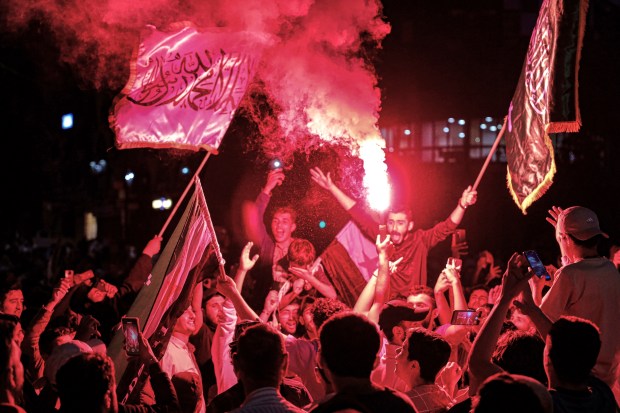Recently, in the middle of the last class of the day, while I was teaching George Orwell’s “1984,” the sky went from blue to black, a severe weather alert went off on students’ phones and we all found ourselves sitting in a hallway, our backs against the lockers. A tornado in St. Louis would leave five people dead and 5,000 homes damaged. My colleagues were calm and concerned. The students were well behaved.
With decades of teaching and hundreds of drills for school shooters, fires and tornadoes under my belt, I told the students one of the jokes I’ve refined, while we waited for the danger to pass. (Ah, teacher jokes!) One student, Emily, should go outside to determine the rotation of the tornado and another, Ben, who is very tall, could get out there and spin in the opposite direction.
“That would neutralize the tornado,” I said. “End of problem.”
As this school year ends, I’m forced by our administration to reflect. I logged that reflection online, and it was approved. I also logged the results from my “research” the state forces me to do. I studied students’ thoughts about the grading contract I’ve been using to “decenter grading” and “alleviate anxiety.” Here’s a funny truth: Students will learn without grades. Here’s a not-funny truth: Grades measure compliance. As a teacher, I can choose to motivate students by manipulating their fear of grades or I can subvert their ideas about grades and inspire them to learn because a good human being becomes a better human being when they are learning for real.
Anyway, I want to keep my job, so I comply with my school’s mandates, even though my colleagues and I know it is mindless hoop jumping that keeps us unfired. We know Big Brother is watching us. I’m a double-plus good teacher. Well, I still have a job.
A former student of mine who is an adult with children argues back and forth with me before sunrise via messaging on Instagram. He’s conservative and thinks President Donald Trump can challenge the status quo of Washington and make necessary changes. He thinks Trump will make things better for “the average Joe.” I push back, asking him: “Who is Average Joe?” I ask him: Who is being harmed the most without Roe v. Wade in place? Trump will make the wealthy wealthier, and Trump won’t help the environment and will send tax dollars to private schools.
I tell my former student I don’t have faith in either party. They resemble each other, and both fund a genocide in Gaza, the most disgusting thing on our toasted planet. Fortunately, my former student doesn’t like war crimes either. When I was a new teacher in my 20s, I never thought I’d be debating a former student in his 40s.
Where I teach, students, staff members and administrators are deadly silent about Israel’s horrific actions, funded by the very tax dollars that make our elite suburban public school possible. In order to keep my job, I’ve taken to saying to my students — whenever we might nudge against the real world in the books we study, and some Americans despite their luxury connect with the suffering of others in our city schools or across the sea, where children lose limbs and lives — “As you know, as a teacher, I’m politically neutral.” Sometimes, I’ll add, I can’t share my religious beliefs with you either.
But because of their race, gender, educational background, age and sexual orientation, teachers are always sharing their political views.
There is no nonpolitical moment in a school, even in math or science classrooms. If you’ve read Orwell, you know the main character, Winston Smith, knows “freedom is the freedom to say that two plus two make four.” But there is the potential for that freedom to be lost. If one group of people has enough power, the members of that group can say that news is fake news, they can say you are not an American even if you are born on American soil and they can say structural racism no longer exists.
Orwell knew that the battle for freedom happens at the level of language.
That’s why I teach English and write. That’s why I try to help my students gather strength with their use of language — vocabulary, syntax and figures of speech — so when destruction arrives in a spinning vortex of ignorance, they will know how to spin in the opposite direction.
Adam Patric Miller has taught high school for 25 years in three states and currently teaches in St. Louis. He is the author of the book “A Greater Monster.”
Submit a letter, of no more than 400 words, to the editor here or email letters@chicagotribune.com.



